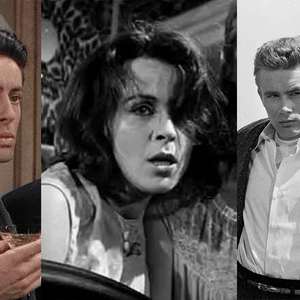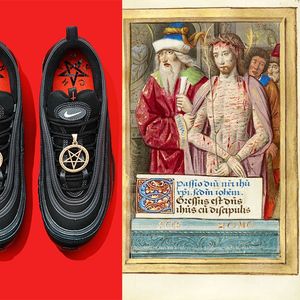CONTACTStaffCAREER OPPORTUNITIESADVERTISE WITH USPRIVACY POLICYPRIVACY PREFERENCESTERMS OF USELEGAL NOTICE
© 2024 Pride Publishing Inc.
All Rights reserved
All Rights reserved
By continuing to use our site, you agree to our Private Policy and Terms of Use.
Adolph Green, whose six-decade collaboration with Betty Comden helped create such joyous stage celebrations of New York as On the Town and Wonderful Town as well as the classic movie musical Singin' in the Rain, has died. He was 87. Green, an icon to gay musical theater fans everywhere, died at his Manhattan home Wednesday night, according to his son, Adam, on Thursday. On Broadway, Comden and Green (the billing was always alphabetical) worked most successfully with composers Leonard Bernstein, Jule Styne, and Cy Coleman. The duo wrote lyrics and often the books for more than a dozen shows, many of them built around such stars as Rosalind Russell, Judy Holliday, Phil Silvers, Carol Burnett, and Lauren Bacall. The best Comden and Green lyrics were brash and buoyant and full of quick wit, best exemplified by "New York, New York,'' an exuberant and forthright hymn to their favorite city. Yet even the songwriters' biggest pop hits--"The Party's Over,'' "Just in Time,'' and "Make Someone Happy''--were simple, direct, and heartfelt. It was On the Town, a musical comedy expansion of Jerome Robbins's ballet Fancy Free, that introduced Comden and Green to Broadway in 1944. The story of three sailors on a 24-hour leave in wartime New York was tailor-made for the time. The music was by the openly gay Bernstein, an old friend of Green's. Comden and Green wrote the book and lyrics, including two plum roles for themselves. It wasn't the only time they combined performing and writing, most notably in their two-person show A Party With Betty Comden and Adolph Green, which was first done on Broadway in 1958 and periodically revived over the years. They won five Tony awards, with three of their shows--Wonderful Town, Hallelujah, Baby! and Applause--winning the top prize for best musical. The duo received Kennedy Center honors in 1991. On film, their most celebrated work was the screenplay for Singin' in the Rain (1952), considered by many to be the finest movie musical ever made. The story of the silent movie industry's transition to talkies starred Gene Kelly, Debbie Reynolds, and Donald O'Connor. A 1985 stage adaptation was not as successful, running less than a year. In 1953 they had another film hit with The Band Wagon, starring Fred Astaire and Cyd Charisse. That same year Comden and Green reunited with Bernstein on Broadway for Wonderful Town, a musical version of My Sister Eileen. Russell scored a personal triumph as plain-Jane magazine writer Ruth McKenny. Edie Adams was her winsome sister Eileen. A succession of collaborations with Styne followed, including the 1954 Mary Martin Peter Pan, in which they were brought in to augment an already existing score; Bells Are Ringing (1956), written specifically for Holliday; and Do Re Mi (1960), a raucous look at the jukebox industry that featured Silvers and comedian Nancy Walker. One of their biggest Broadway successes was Applause (1970), a show for which they wrote the book but not the lyrics. The two did an expert job tailoring the film All About Eve to the talents of Bacall. And with Coleman, they wrote On the Twentieth Century (1978), which starred John Cullum, Madeline Kahn, and Imogene Coca. Comden and Green had their share of stage flops too, most famously A Doll's Life (1982). It was a misguided attempt to figure out what Nora did after she slammed the door and walked out on her husband in Ibsen's A Doll's House. The musical ran five performances. Yet their longest-running show, The Will Rogers Follies, opened in 1991, a Ziegfeld-style retelling of the life of the famous humorist. Keith Carradine played Rogers in this lavish production, which was directed by Tommy Tune and had music by Coleman. Green was born in 1914--some references give a later date--in the Bronx, the son of Daniel and Helen Green. After high school, he worked as a runner on Wall Street while trying to make it as an actor. He met Comden through mutual friends in 1938 while she was studying at New York University. They formed a troupe called the Revuers, which performed in the Village Vanguard, a club in Greenwich Village. Out of necessity, Comden and Green began writing their own material. Among the members of the company was a young comedian named Judy Tuvin, who changed her name to Judy Holliday when she got to Hollywood. After On the Town, Comden and Green's next two musicals, Billion Dollar Baby (1945) and Bonanza Bound (1947) were not successful. In fact, Bonanza Bound died in Philadelphia en route to New York. Discouraged, they left for California, where they found a home at MGM. There they wrote screenplays for Good News, starring June Allyson and Peter Lawford, and the film version of On the Town, which scrapped most of Bernstein's melodies, replacing them with music by Roger Edens. It even sanitized the lyrics to "New York, New York.'' Yet the movie, starring Frank Sinatra and Gene Kelly, was a huge hit. More recently, Comden and Green participated in the unsuccessful Broadway revival of On the Town in 1998 (which costarred Lea DeLaria) and streamlined the book for a new version of Die Fledermaus for the Metropolitan Opera that same year. And last year there was a short-lived revival of Bells Are Ringing, with Faith Prince in the Holliday role. Green married actress Phyllis Newman, who had been Holliday's understudy in Bells Are Ringing, in 1960. Green is survived by his wife, son, and a daughter, Amanda. Funeral arrangements were incomplete.
Want more breaking equality news & trending entertainment stories?
Check out our NEW 24/7 streaming service: the Advocate Channel!
Download the Advocate Channel App for your mobile phone and your favorite streaming device!
From our Sponsors
Most Popular
Here Are Our 2024 Election Predictions. Will They Come True?
November 07 2023 1:46 PM
17 Celebs Who Are Out & Proud of Their Trans & Nonbinary Kids
November 30 2023 10:41 AM
Here Are the 15 Most LGBTQ-Friendly Cities in the U.S.
November 01 2023 5:09 PM
Which State Is the Queerest? These Are the States With the Most LGBTQ+ People
December 11 2023 10:00 AM
These 27 Senate Hearing Room Gay Sex Jokes Are Truly Exquisite
December 17 2023 3:33 PM
30 Steamy Photos of Folsom Street Fair 2023 Debauchery
October 15 2023 11:06 PM
10 Cheeky and Homoerotic Photos From Bob Mizer's Nude Films
November 18 2023 10:05 PM
42 Flaming Hot Photos From 2024's Australian Firefighters Calendar
November 10 2023 6:08 PM
These Are the 5 States With the Smallest Percentage of LGBTQ+ People
December 13 2023 9:15 AM
Here are the 15 gayest travel destinations in the world: report
March 26 2024 9:23 AM
Watch Now: Advocate Channel
Trending Stories & News
For more news and videos on advocatechannel.com, click here.
Trending Stories & News
For more news and videos on advocatechannel.com, click here.
Latest Stories
The Advocate's Jake Shears cover: Go behind the scenes
April 08 2024 4:17 PM

Pride
Yahoo FeedUnlocking a new level of beauty with Dr Botanicals' ethical skincare line
April 08 2024 3:39 PM

Pride
Yahoo FeedUnleash your wild side with The Pride Store’s beginner’s guide to kink
April 08 2024 3:34 PM
'Written in the Stars:' University of Michigan hosts 'Pride Prom' for LGBTQ+ students
April 08 2024 12:51 PM
Best tips to see today’s eclipse, according to this famed gay astrophotographer
April 08 2024 11:17 AM
Vatican condemns gender-affirming surgery as threatening ‘unique dignity’ of a person
April 08 2024 9:20 AM
These are the most challenged library books in America — yes, most are LGBTQ+
April 08 2024 8:31 AM
Like a vacuum, Trump sucks up RNC funds, so why would anyone donate to the party?
April 07 2024 7:51 PM














































































